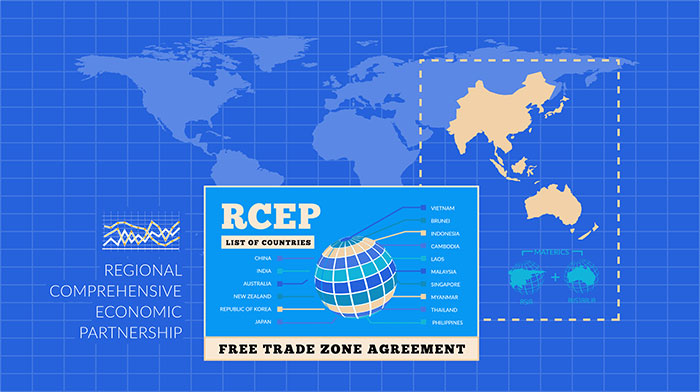The RCEP Free Trade Agreement A Key Factor In BRI Growth & Development
FTA accounts for US$12.7 trillion – over 25% of global trade in goods and services
The Regional Comprehensive Economic Partnership (RCEP) and the Belt and Road Initiative (BRI) are contributors to regional and global economic recovery efforts, academics speaking at the 17th annual international conference on “New World Order: Competition, Integration and Multipolarity”, at the Institute of China Studies at the Royal Academy of Cambodia have stated. The remarks were made by senior economist Ky Sereyvath, a Director-General of the Institute.
Coming into force on January 1st this year, the RCEP agreement includes 15 Asia-Pacific countries including 10 ASEAN member states and their five main trading partners – China, Japan, South Korea, Australia and New Zealand.

Sereyvath said that the RCEP has provided larger market access for all participating countries with preferential tariffs, promoted greater regional cooperation in trade and investment, and eased cross-border movements.
“The RECEP regional trade deal keeps markets open, strengthens regional economic integration, supports an open, free, fair, inclusive trading system, and ultimately, contributes to global recovery efforts.” he said. “It has helped create new business and employment opportunities, strengthen supply chains in the region, and promote the participation of micro, small and medium enterprises in the regional value chains and production hubs.”
According to the World Bank, the RCEP covers 2.3 billion people or 30% of the world’s population, contributes about US$25.8 trillion to global GDP per annum – about 30% of the annual total, and accounts for US$12.7 trillion – over 25% of global trade in goods and services.
Joseph Matthews, a senior professor at the BELTEI International University in Phnom Penh, said the world’s biggest trading bloc has provided mutually beneficial cooperation for all participating countries.
“The RCEP has not only promoted greater regional economic integration, but also underscored the unwavering commitment of all member countries to free trade and multilateralism,” he said. “It is unlike the U.S.-led Indo-Pacific Economic Framework (IPEF), which is a group to undermine regional economic development and to create conflicts in the Asia-Pacific region.”
During the conference, analysts also touched on the importance of the BRI.
Matthews said the BRI has played a crucial role in helping countries cushion the economic fallout. “The BRI will become the new engine of global economic growth,” he said. “It will continue to boost regional and global cooperation in terms of hard and soft infrastructures, economy, trade, investment opportunities, cultural exchange, and people-to-people connectivity.”
Businesses looking to evaluate which RCEP markets may be the most attractive for their exports may contact Dezan Shira & Associates for market research assistance. The practice has offices throughput the region. Please email asia@dezshira.com
Related Reading





